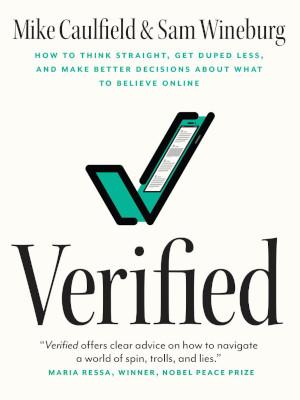I just read Verified: How to Think Straight, Get Duped Less, and Make Better Decisions About What to Believe Online by Mike Caulfield and Sam Wineburg (University of Chicago Press, 2023) and I really liked it. This is a very good introduction to information and digital literacy, well written with a lively tone. I recommend it to anyone interested in assessing online information—from librarians doing IL to people wondering about apparent misinformation or vaguely conspiracy-minded links they get sent.

It uses the SIFT approach: Stop, Investigate the source, Find better coverage, and Trace back to the original context. (This is intentionally not a checklist like the PARCA test). There are many examples, illustrated with lots of images of web pages and Google searches. Someone new to this would learn good practices, and someone experienced would see a well-presented approach that gives insightful coverage of familiar issues. It’s good on the inherent “compellingness” of some web sites and sources, and how to do a vibe check. The chapter on Wikipedia is very good, and I like how they depend on Wikipedia as the best place for quick checks on the reliability of sources such as journals and think tanks. It is.
The book is grounded in an assumption of good faith—that someone wants to determine the truth and validity of some information they see online. Many do. But many don’t. If they don’t, they’re not going to read a solid, practical introduction like this. On the other hand, if you’re helping or teaching high school students or undergraduates, you have an ideal audience for this book.
There’s a postscript about ChatGPT and large language models, which went big just as the book was being finished. It’s as good as anyone could manage given the timing, but how well will the SIFT approach, or PARCA, or anything else, work if (when) everything is obscured by torrential amounts of bullshit? (Except Wikipedia, I hope.)
There’s a good review by Joel Blechinger in The Journal of Radical Librarianship (vol. 10, 2024) that goes deeper into some issues. See also this thoughtful review by Stephen Michaels in College & Research Libraries (vol. 85 no. 2, 2024).
 Miskatonic University Press
Miskatonic University Press